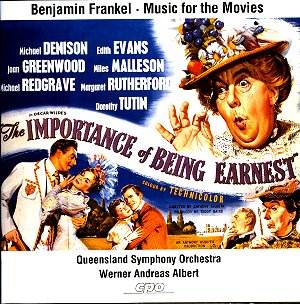My
heart sank when the crashing Offenbachiana of the opening of the
first track burst in. However what did I expect? This is, after
all, music for an amusing film and play - 'The Importance of Being
Earnest'. Frankel provided a very inventive score - Nutcracker
writ modern. Along the way we get at least one striking episode
where oleaginous supra-stratospheric sliding violins play pianissimo.
The
Werewolf film offered the late Oliver Reed his first starring
role. This is a toothsome morsel with hints of Mahler 4 and Beethoven
Pastoral along the way. Looks like a good case for a complete
recording. The Night of the Iguana is recorded complete
for the first time. There are ten tracks. The Prelude deploys
glassy Sibelian violins and links thematically with Frankel's
concert work A Catalogue of Incidents from Romeo and Juliet.
It does not shrink from a hint of Copland's prairie
nocturnes. Speaking of Copland, The Mexican Washerwoman sounds
like a cross between Ravel's Pavane and the quiet moments
in El Salon Mexico. This is certainly serious film music
from the souring trumpet cantilena at 1.45 in The Letter
to the atonal tarantella of Shanghai The Coach. The
Hannah and Shannon theme is worthy of the psychological subtlety
of the score: pointillistic, cloud-hung, doom-laden feeling even
a distant shade of Mahlerís infamous adagietto. You get the feeling
that this score was about something that mattered in the great
scheme of things.
At
the other end of the scale we come to Trottie True which
is rife with frothy Edwardian gaiety, Waldteufel and Offenbach
with a touch of Lehár all done with élan. Along
the way we get Sousa-style horn swoon, swooped alco-hazed flute
theme; all in all a sensuous but not overheated period piece.
Fluffy and done with ease and accomplishment. The Years Between
is a lullaby. Lana Owen and Buxton Orr, as Frankel pupils,
advised on the arrangement by Kennaway from the piano solo played
on screen by Eileen Joyce. Kennaway did not have access to the
film itself. It was arranged from published sheet music. It is
an ordinary little theme but sensitively put across by the solo
violin touched in over the main body of strings. The Lily Watkins
theme very popular but lost from sight until now though recorded
in the 'fifties by Melachrino, Wally Stott and Laurie Johnson.
The
tracks from Footsteps in the Fog represent about half of
the original score. The performing materials were created by Dimitri
Kennaway from listening repeatedly to the soundtrack. It at first
sounds like quite a marine score with cymbal-evoked waves smashing
on craggy headlands. The tracks include music suggestive of disillusion,
sour bleak sunrises and a stalking storm at end. Its more eldritch
moments remind the listener of the surreptitious marsh music from
Korngoldís Elizabeth and Essex and Waxman's for Prince
Valiant.
The
notes, which are in German, English and French, reward close reading.
These are eked out with cinephile references like the pointer
to two youthful and otherwise uncredited extras in Trottie
True: Roger Moore and Ian Carmichael.
If
you would like to catch Frankel in his most seriously inventive
vein then go for the CPO disc of The Battle of the Bulge
otherwise brace yourself for some jolting gear-changes.
Rob
Barnett
see
also review by Hubert
Culot
